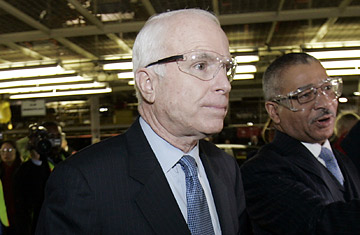
John McCain tours the Ford Motor Wayne Assembly plant in Wayne, Michigan, February 21, 2008.
Anytime John McCain declines to speak to the press, something horrible must be happening.
Back in New Hampshire, McCain held press conferences after every event, taking questions from reporters more often than he'd rub his lucky nickel. In Iowa, he would talk to scribes for hours on his bus, get off and then 30 minutes later hold an avail. The journalists would look at each other, bemused and defeated, with no questions left.
But Thursday was a different matter. In the wake of a scandalous New York Times story suggesting a romantic fling with a lobbyist, McCain arrived at a Ford Focus car assembly plant with a decidedly tense grin plastered across his face. His campaign staff promptly separated anyone with a pen or a tape recorder from the candidate. "The McCain campaign decided who they wanted on the tour, and it's only photographers," a nice lady from Ford announced after a reporter spotted the candidate behind a car chassis and tried to approach him.
He certainly needed some time without interrogation. The day started off rocky enough at a morning press conference in Toledo. "It's not true," McCain said of the Times piece, as if three words would be the end of it. But the questions kept coming. Did you have a romantic relationship with the lobbyist, Vicki Iseman? "No." Did you ever talk to your staff about their concerns about his relationship? "No." Were you closer to Iseman than other lobbyists? "No." Do you regret writing letters to the FCC on her behalf? "No." Then McCain's wife Cindy took the microphone. "My children and I not only trust my husband," she said, "but know that he would never do anything to not only disappoint our family but to disappoint the people of America."
Later, as his tour of the Ford plant 50 miles north was winding down, McCain was finally forced to wander over to the print reporters—not to talk, just to look at more cars. He was trailed by a mob of photographers and Cindy, smiling in a black turtleneck, her hair tightly wound. "Very interesting," he said, just before someone showed him the Escape Hybrid. "This is the future obviously." Another Ford executive put him in the driver's seat of a Focus, which could play an iPod on voice command. "Play Abba," said McCain. But the iPod did not have Abba. It could play The Doors—"Roadhouse Blues."
Then it was over. The 2 p.m. press conference was canceled, despite the chairs and riser that had been set up for the cameras. The candidate was ushered out of the building, with his family and staff. The press was ushered off to a hotel for three hours in a mirrored dining room, until McCain finished a fund raiser. The campaign entered a rare state of lockdown.
In more peaceable times, McCain calls reporters "my base." He is chummy even with New York Times stars like Maureen Dowd, and uses Adam Nagourney as a frequent punchline. But the campaign is, at least for now, at war, sending its supporters out to the television networks to spin the story back on the Times. "We need your help to counteract the liberal establishment and fight back against the New York Times by making an immediate contribution today," wrote campaign manager Rick Davis sent in an email fundraising solicitation. The Republican Party followed suit. "The New York Times has proven once again that the liberal mainstream media will do whatever it takes to put Senator Hillary Clinton or Barack Obama in the White House," wrote the party chairman, Mike Duncan.
At the end of the day, McCain boarded the plane with his wife, his staff and his daughter, Meghan, who trailed an entourage of friends, bound for Indianapolis. On another night, he would have sauntered to the back to chew the fat with reporters. But on this night, he only came halfway down the aisle, keeping a safe distance. "Everybody happy?" he called out. "Fun day. Fun day." McCain's eyebrows bounced up and down to signal his sarcasm.
His question, of course, was rhetorical. He didn't want to hear anything more. Before anyone could answer he had wheeled around and gone back to his seat, beyond the reach of reporters and their notebooks for just a while longer.
